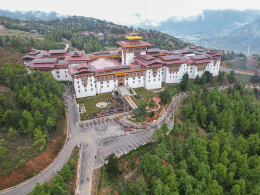In an ambitious move to ride the global wave of artificial intelligence, cloud computing, and data storage expansion, Bhutan is setting the groundwork to establish mid-to-large-scale green data centers as part of its 21st Century Economic Roadmap under the Digital Economy pillar.
The plan envisions constructing a 40–50 megawatt (MW) AI-focused data center, with an estimated investment of USD 450 million. Construction is slated to begin in 2027 and span three years. However, if high-end AI infrastructure such as NVIDIA chips is included, the total investment could surge to USD 2–2.5 billion for a 50 MW facility — or even USD 4–5 billion for a 100 MW project, depending on the scale.
Strategic Positioning and Global Demand
Bhutan’s push comes amid soaring global demand for data processing capacity. The number of data centers worldwide has surpassed 11,000, requiring over 508 terawatt-hours (TWh) of electricity annually. By 2034, that demand is expected to triple to more than 1,580 TWh — roughly equivalent to India’s entire current energy consumption.
The global data center market is growing at a breakneck pace, with annual capacity expected to increase by 19–22 percent until 2030. Major technology firms like Amazon, Microsoft, Alphabet, and Meta are set to invest over USD 320 billion in AI and data centers in 2025 alone.
With a current installed hydroelectric capacity of 2,326 MW and plans for expansion, Bhutan has a unique edge in this high-stakes race: renewable energy. The country’s abundant hydropower and cool climate position it as an ideal green destination for hyperscalers and technology investors seeking sustainable data center solutions.
Bhutan’s Value Proposition
Officials believe Bhutan’s value proposition is compelling — clean and competitive energy prices, favorable weather that reduces cooling costs (which typically account for 40% of data center energy use), and its alignment with global sustainability goals and Bhutan’s own Gross National Happiness (GNH) philosophy.
The government envisions building facilities either within the upcoming Gelephu Mindfulness City or other suitable regions, depending on legal, fiscal, and seismic considerations. Employment opportunities are significant: a 50 MW data center could employ 800–1,000 people during construction and another 300–500 during operation, with many more indirect jobs expected.
A Multi-Phase, Partnership-Driven Approach
In the short term, the GovTech Agency and Druk Holding and Investments (DHI) will lead a feasibility study to assess market demand, infrastructure requirements, investment frameworks, and site viability. Concurrently, Bhutan is initiating dialogue with potential partners — including global AI firms, cloud solution providers, and data center operators.
An official familiar with the project noted that Bhutan cannot finance such large-scale investments alone. The government is exploring strategic partnerships and funding strategies, including signing anchor clients such as Amazon or Microsoft and even exploring financing options with chipmakers like NVIDIA.
“Securing one major hyperscaler client could unlock further investment,” the official stated. “Our clean energy is a powerful bargaining chip.”
Challenges to Overcome
However, challenges loom. Bhutan’s hydropower output dips in winter, potentially disrupting the continuous power supply that data centers demand. The country will also need to strengthen its fiber optic connectivity with India and Bangladesh and ensure robust seismic resilience, especially since much of Bhutan lies in earthquake-prone zones IV and V.
Regional Relevance and Outlook
With Southeast Asia projected to attract up to USD 60 billion in data center investments in the coming years, Bhutan aims to tap into the growing regional digital economy, particularly targeting India, whose share of hyperscaler revenue is forecast to reach 5 percent by 2028.
Bhutan plans to build 50–100 MW data centers to serve markets in India and South Asia, transforming itself from a hydropower and agriculture-dependent economy into a green digital hub.
By aligning with global sustainability trends, leveraging its renewable energy assets, and investing in advanced infrastructure, Bhutan is poised to carve out a niche in the rapidly evolving digital economy — and turn its serene landscape into a center for global data and innovation.








